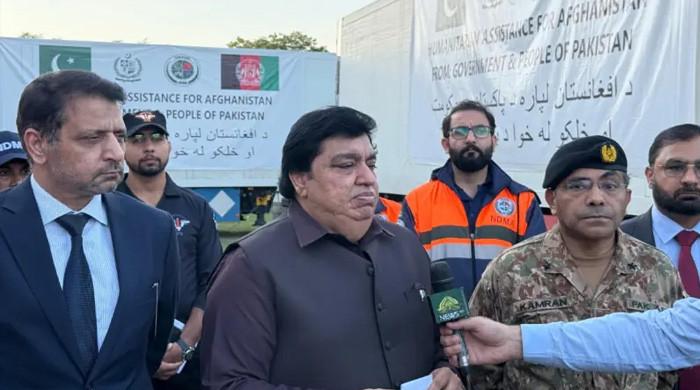 |
| State Minister for Religious Affairs and Interfaith Harmony Kheal Das Kohistani (centre) along with NDMA, foreign ministry officials addresses media as Pakistan dispatches humanitarian assistance to quake-hit Afghanistan, September 3, 2025. — PTV News |
Pakistan Sends 105 Tonnes of Vital Humanitarian Aid to Aid Afghanistan After Devastating Quake
Pakistan Dispatches 105 Tonnes of Humanitarian Aid to Help Earthquake-Ravaged Afghanistan
In response to a deadly 6.0-magnitude quake, Pakistan delivers 105 tonnes of relief—food, medicine, tents, blankets—to Afghanistan via Torkham. A gesture of solidarity amid a growing humanitarian crisis.
State Minister for Religious Affairs and Interfaith Harmony Kheal Das Kohistani along with NDMA, foreign ministry officials addresses media as Pakistan dispatches humanitarian assistance to quake-hit Afghanistan, September 3, 2025. — PTV NewsThe federal government has dispatched 105 tonnes
A Disaster of Unprecedented Scale
This generous aid is arriving in the aftermath of one of
Afghanistan’s deadliest earthquakes in years. In eastern Afghanistan, areas
like Kunar, Nangarhar, and Laghman were left reeling after the 6.0-magnitude
quake struck. Initial reports put the death toll at over 800, but later
figures climbed to more than 1,100, with over 3,200 injured and
thousands of homes destroyed in remote villages. Rescue teams continue
struggling against rough terrain and persistent aftershocks as they aim to
reach more survivors.
Pakistan’s timely deployment of relief supplies comes as a
crucial lifeline—especially given logistical hurdles and funding shortfalls
hampering international aid efforts. The World Food Programme has warned that
food reserves could run dry in as little as four weeks without more support.
Pakistan’s delivery helps bridge that critical gap.
A Gesture Rooted in Kinship and Duty
Pakistan’s relief conveys more than material support—it is a
reflection of shared history, ties, and responsibility. After the ceremony at
Islamabad’s NDMA warehouse, Minister of State for Religious Affairs Kheal
Das Kohistani emphasized the spiritual and national duty to stand with
neighboring communities in crisis. For many affected families, these supplies
will offer more than shelter—they represent hope.
Several regional players, including India, Iran, Turkey, and
European nations, have also opened supply channels. Yet Pakistan’s logistical
advantage—seen in its swift convoy dispatch—stands out. With aid supplies often
delayed in rugged provinces like Kunar, early access through Torkham could save
lives.
Beyond Aid: A Call for Continued
Support
While 105 tonnes of relief is significant, the scope of need
remains immense. Thousands remain displaced in makeshift camps, with scarce
sanitation, fresh water, and medical care—especially for children, elders, and
expectant mothers. Aftershocks heighten the risk of further collapses,
particularly in areas with mud-brick housing.
Pakistan’s intervention is both a lifeline and a nudge for more sustained aid mobilization. The United Nations, regional governments, and international NGOs are being urged to match not just quantity but coordination and respect for community resilience.

